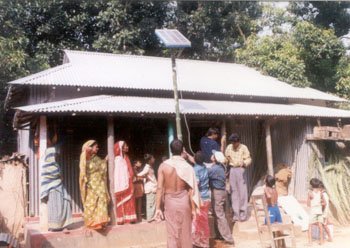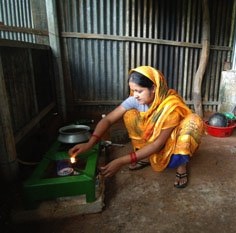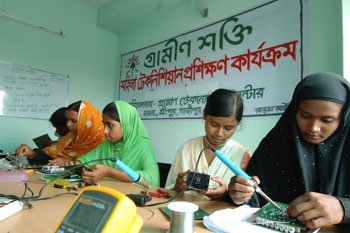 On Social Business Day, W4 spotlights the revolutionary work of Grameen Shakti, which offers access to affordable, renewable energy for rural communities in Bangladesh and promotes livelihoods for the country’s poorest—the majority of whom are women—while also protecting villagers’ health and cutting fossil fuel dependence and pollution.
On Social Business Day, W4 spotlights the revolutionary work of Grameen Shakti, which offers access to affordable, renewable energy for rural communities in Bangladesh and promotes livelihoods for the country’s poorest—the majority of whom are women—while also protecting villagers’ health and cutting fossil fuel dependence and pollution.

Photo : the Yunus Center
|
Bangladesh may be one of the world’s most impoverished countries, but it is also home to some of the most innovative, internationally-acclaimed approaches to the eradication of persistent and extreme poverty. One such approach is that of Grameen Bank, founded in 1983 by the Bangladeshi economist and banker, Muhammad Yunus. Now a recipient of a Nobel Peace Prize and a legendary force in microcredit, Professor Yunus has worked tirelessly for the poorest of the poor, devising a system of very small loans to help the millions of people living in extreme poverty in Bangladesh. Grameen Bank has long been renowned for its success in creating jobs, stimulating local economic growth, and producing budding entrepreneurs.
One of the bank’s most ambitious projects is the social business venture Grameen Shakti (GS), which means ‘Rural Energy’. For 16 years, this non-profit energy company has been providing Bangladesh’s rural poor with affordable, reliable, and renewable energy. The scale of this task is staggering. For the vast majority of the country’s 100 million-strong rural population, many of whom live beyond the national energy grid, the erratic supply and high cost of energy undermine families’ well-being and pose major barriers to progress. 70% of Bangladeshi villagers—that’s more than the entire population of the United Kingdom—have no electricity. Most cook on wood-burning stoves and light their homes with kerosene lamps. Each of these fuels is expensive, one of them is non-renewable—and burning them indoors gives rise to many health problems as well as accidental fires.
 Photo : Grameen Shakti
|
Grameen Shakti’s pioneering engineers have come up with solutions designed to meet the specific energy needs of the world’s most poor. Their first product, the Solar Home System, has already enabled as many as 8 million people in rural Bangladesh to light their homes and businesses using solar power.

Photo : Grameen Shakti
|
In remote regions, cooking accounts for the bulk of energy consumption: with this in mind, Grameen Shakti launched an Improved Cooking System (ICS) that consumes half as much fuel as traditional stoves and diverts any harmful fumes outside of the dwelling. By the end of 2012 well over half a million rural households had already installed an ICS. And for those villagers who own cattle, GS has constructed affordable biogas plants that produce natural gas, used for cooking, from manure.
Grameen Shakti, like Grameen Bank, is not a charity and does not provide free products or services. Instead it is a social business—one that is financially self-sustaining, but takes no profit, and defines it success in terms of its social impact. “Solar Home Systems can be installed at a cheaper price within a social business model,” Yunus explains, because “there is no intention to make personal profit.” Villagers usually pay in installments, sometimes with the help of a microcredit loan, and they always have the option of returning appliances and canceling the remaining installments if they are not satisfied with the product. Once they have experienced life with the new appliances, very few people choose to cancel.

Photo by Grameen Shakti
|
News of renewable energy and its wonders is spreading fast through rural Bangladesh. GS products run independently of the electrical grid, require little or no fuel, and come with free maintenance provided by local, familiar faces—many of them female. Through GS’s renewable energy drive, countless illiterate or semi-literate women, whose prospects of earning a living were once slim, have become self-employed entrepreneurs. Like Grameen Bank, which has consistently championed rural women as the main protagonists of change in Bangladesh through microcredit, this social business trains and recruits women engineers and technicians to manufacture, install, and maintain its products. Thanks to their new expertise and customer bases, many women are subsequently able to get jobs repairing and fitting other electrical appliances.
With over 11,000 employees, GS has had a radical effect on rural communities, not least by improving women’s standing. As solar engineer Sayma Sultana testifies: “Lots of people are curious about my work. For them it seems very difficult and unusual for an uneducated, rural woman, and they ask me, ‘How did you learn this work?’ and I tell them that I learnt it here, at this Grameen Technology Center.” Local business has also been boosted as solar electricity allows shops and restaurants to stay open later, while cutting fuel bills and becoming fume-free.
Since tens of millions of Bangladeshi households are yet to be reached, Grameen Shakti’s ambition for ‘renewable energy [to] become the norm in Bangladesh’ remains a tall order. Demand for services runs high, but GS is held back by the relatively high cost of solar panels. This is why Professor Yunus is calling on governments and businesses to get serious about promoting clean energy over fossil fuels. “I see an enormous possibility here,” Yunus says. “Social business is the most effective way to spread renewable energy… But cost will be the deciding factor. The world needs to put a great emphasis on the research to make the technology cheaper and more efficient. If this is done, the goal can be achieved.”
If Yunus’s call is heeded and a renewable energy revolution finally takes hold, the impact on the lives of the poor—not just in Bangladesh, but the world over—could be monumental.
Visit the Grameen Shakti website to learn more.
© Women’s WorldWide Web 2013













